
Close


Dutch priest Henri Nouwen once said, “A waiting person is a patient person. The word patience means the willingness to stay where we are and live the situation out to the full in the belief that something hidden there will manifest itself to us.”
We were both apprehensive when we were told that we had to change teams. We only had a chance to work on an elder abuse case together in 2020 but we did not know each other’s personality and working style well. Being the professionals that we are, we took on the re-shuffling in our stride and embraced the change.
With the openness that sought to understand the other person’s perspectives and motivations as well as rounds of open communication, we gained a better understanding of each other’s working style as well as personal and professional values.
This move has taught us to trust in the process and change, and to be present in the moment instead of being regretful of the past and anxious of the future. Through working with our new team of nurses and doctors, we saw how they worked tirelessly to attend to our patients and their families. Both nurses and doctors toiled endlessly, seeing patients and families throughout the day. Despite the fears of COVID-19, the grueling number of home visits in a day and the difficulties and challenges they face at each home visit, they put on a smile when they go on to the next home visit, all with the goal of adding life to the days of our patients and families.
This has taught us the value of time, for our patients are with us for only a limited time. We learnt to make the best of the remaining time that we have with our patients and their families. The team also taught us resilience, to face challenges head on, have open communication and always give our best for our patients and families, no matter what personal and professional difficulties we might face.
Synergy among the team
Sometime back, our team ministered to Mr A, who lived alone and was resistant to our initial visits, often citing having other errands to run. Through the persistent efforts of the nurse, we were finally able to form a working understanding with him, to arrange for visits. We got off to a difficult start, as he had his own ideas of how to seek treatment, refused to take his medication, and often experimented with alternative treatments and self-concocted remedies.
As time went by, Mr A deteriorated and required full-time care. However, he was adamant on remaining at home for as long as possible. Through the efforts of the team, including the nurses, doctors, both social workers and even our spiritual care counsellor, Mr A was able to acknowledge and accept that he was worthy to be cared for. With the collective efforts of the team, he was able to stay at home for as long as possible before he needed institutional care, due to the lack of a full-time care-giver.
Sum of our experiences
The sum of our experiences of tears, laughter, pain, joy, sorrow, disappointment and celebration and the culmination of how we interact with our patients and families allow us to gain deeper insights into their fears and motivations and enable us to attend to our patients and families in a more compassionate and wise way. The result of this wisdom gained transcends into our personal sphere and makes us treasure and prioritise the intrinsic values of life, like inner peace, families and relationships.
Sometimes being present is not about trying to change the other person or giving advice to do something better. Sometimes it is about just being there, with them, in that moment.
Below is a short excerpt from Winnie the Pooh.
“Today was a Difficult Day,” said Pooh.
There was a pause.
“Do you want to talk about it?” asked Piglet.
“No,” said Pooh after a bit. “No, I don’t think I do.”
“That’s okay,” said Piglet, and he came and sat beside his friend.
“What are you doing?” asked Pooh.
“Nothing, really,” said Piglet. “Only, I know what Difficult Days are like. I quite often don’t feel like talking about it on my Difficult Days either.
“But goodness,” continued Piglet, “Difficult Days are so much easier when you know you’ve got someone there for you. And I’ll always be here for you, Pooh.”
And as Pooh sat there, working through in his head his Difficult Day, while the solid, reliable Piglet sat next to him quietly, swinging his little legs…he thought that his best friend had never been more right.”
-A.A. Milne – Author of Winnie the Pooh